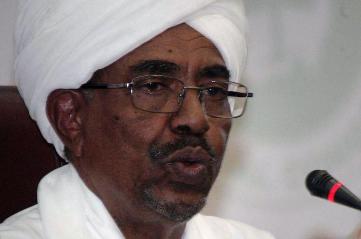Bashir speech represents only 1% of reform document: official
January 31, 2014 (KHARTOUM) – The leading figure at Sudan’s ruling National Congress Party (NCP) and former state minister at the Ministry of Finance Ahmed al-Majzoub, said the speech which was delivered by president Omer Hassan Al-Bashir on Monday represents only 1% of the comprehensive reform document drafted by the NCP.

The long awaited speech by Bashir that was expected to unveil a major reform proposal, created a wave of disappointment among those who followed it including opposition leaders who were present.
Bashir announced a 4-point plan for reform “to stop the war and bring peace, free political society, fight against poverty and revitalise national identity”, calling for political forces to engage in dialogue to agree on the implementation items though he did not specify practical steps to do so.
Opposition figures who were present made statements either personally or through their parties criticising the lack of specifics and excessive generalities that gave no real signs of concessions on the part of the ruling party.
But al-Majzoub stressed in a talk show at the pro-government Ashorooq TV on Thursday that the president’s address which consisted of 22 pages represents only 1% of the actual reform document.
The talk show focused on the economic issues which appeared in the presidents’ speech.
Al-Majzoub pointed that several organizational and economic decision to promote growth of Sudan’s economy will be issued soon, adding that the document was prepared by a committee composed of NCP experts who do not hold official posts in the party or the government.
“Large number of experts was engaged in the preparation of the document. The economic reform document for example is composed of more than 30 pages”, al-Majzoub said.
He said economic stability is contingent upon achieving peace because war depletes resources, stressing the right path to achieve economic growth is to direct resources towards development and economic stability instead of war.
The NCP figure further stressed the creation of the national revenues body which was mentioned in the presidents’ address will be an independent entity.
“We could compensate for our lost revenues through improving relations with South Sudan”, he said
He asserted continuation of governments’ social subsidies, saying the president’s speech clearly underscored importance of increasing production.
Al-Majzoub also said the document called for expanding employment opportunities and combating poverty.
The talk show surveyed several ordinary citizens about their future expectations. Some of them wished agreement among political parties and focus on peace and economic issues while others called for agreement on permanent constitution and reducing prices of basic commodities.
The economic expert, Mohamed al-Nayer, for his part, praised the president’s call for establishing a national independent revenues body, emphasising the need to avoid withholding money by government units.
Previous budgets saw the phenomenon of government units retaining money that should otherwise be sent to the ministry of finance.
The controversial practice sparked national debate regarding the constitutionality of withholding public money by various government units, given that the ministry of finance is the only body which has the legal mandate to collect and disburse government funds.
Al-Nayer called for developing strict mechanisms to enhance ministry of finance control over public money, saying that economic packages should be directed towards benefiting citizens.
He underscored importance of restoring value of the Sudanese pound and stabilising its exchange rate in the coming period, saying the speech tackled well the issue of creating a good investment environment particularly as the Sudanese economy suffers from the foreign debt’s burden.
Sudan’s external debt is estimated to have grown by 27% since 2008 from $32.6 billion to $41.4 billion in 2011. The IMF forecasted the debt level to reach $43.7 billion in 2012 and $45.6 billion in 2013. The latter represents 83% of Sudan’s 2011 GDP, which was $55.1 billion.
Around three quarters of Sudan’s external debt are owed to the Paris Club of creditor nations and other non-member states. The remaining balance is equally divided between commercial banks as well as international and regional financial bodies.
(ST)
